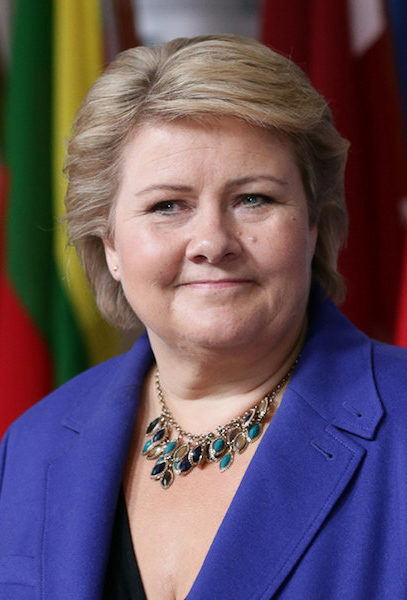Norway seas the future with aquaculture
Prime minister Erna Solberg wants her country to develop an aquaculture industry that can deliver food and economic values within an acceptable footprint.
By SeaWestNews
Norway, ranked as one of the best countries for green living, will further develop the aquaculture industry to churn its economy, sustain the environment and feed the world, the country’s prime minister Erna Solberg said.
The country, which also tops the charts when it comes to the happiness index and as the go to place in the event of a climate change apocalypse, has also put into action a High-level Panel on Building a Sustainable Ocean Economy.
Solberg, (pictured) said her country needs to develop an aquaculture industry that can deliver food and economic values within an acceptable footprint.
Speaking at the Havbruck 2018 conference, which gathered the fish farming industry, along with researchers and politicians, for key discussion on future policy, Solberg said the fish farming industry “has been a huge success. It creates important jobs and sets off major ripples among communities along the coast.”
The main theme of this year’s conference was ‘Aquaculture in Society’, reported Fishupdate.com
The 2.6 million tons of seafood exported from Norway in 2017 is equivalent of 36 million meals every day, year round. The country seafood worth 94.5 billion Norwegian kroner (11.7 billion U.S. dollars) in 2017, a record high both in value and volume, the Norwegian Seafood Council said.
Of the total value of Norway’s seafood exports in 2017, 72 percent came from aquaculture and 28 percent from fishing.
Salmon is the most important species for Norwegian seafood exports, with over 68 percent of the total export value and 38 percent of the volume, according to the council.
‘Challenges have been met and a large proportion of these are solved, using research based knowledge production,” said Solberg.
But there were challenges ahead, especially over the environment, feed production and fish welfare, she argued.
“There are conflicts associated with coastal fishing, wildlife interests, conservation interests, outdoor life and tourism that affect access to the farm areas and, not least, the acceptance of the industry’s environmental impact.
“We need to further develop an aquaculture industry that can deliver food and economic values within an acceptable footprint,” said the prime minister.
Solberg also chairs the High-level Panel on Building a Sustainable Ocean Economy, which is made up of heads of state and government from a broad range of coastal states, including developing countries.
“The oceans have huge potential when it comes to meeting the world’s need for resources and creating jobs and economic and social development. We will not be able to realise this potential without sustainable growth in ocean-based industries,” said Solberg.
“The growing global population means that the world needs more resources and services from the oceans, such as food, energy, medicines, minerals and transport. The intention behind this initiative is to increase international awareness of the fact that sustainable use of the oceans and the maintenance of good environmental status can lead to significant value creation, and can enable us to meet some of the world’s most vital needs in the years to come.
“I want to share Norway’s experience of combining conservation and use of marine resources. Norway has considerable expertise on ocean issues, which means that we can make an important contribution in this area. Our expertise is in demand internationally.”
RELATED STORIES

